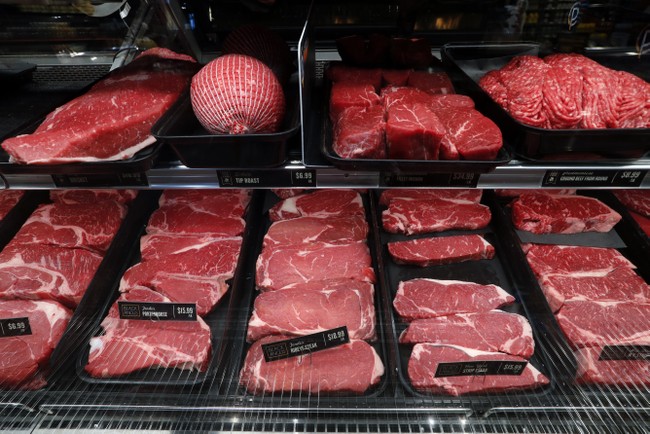
A Florida law banning the sale of lab-grown meat is facing a legal challenge in federal court in a lawsuit filed on Tuesday.
The Institute for Justice and UPSIDE Foods are suing the state over the law, which was passed earlier this year, alleging that the state violated the Constitution by imposing the measure, according to a press release.
Today, the Institute for Justice (IJ)—a nonprofit, public interest law firm—filed a lawsuit challenging a newly enacted Florida law that bans the production, distribution, and sale of cultivated meat—an innovative product that allows consumers to enjoy the taste of meat grown directly from real animal cells, without the need to raise or kill animals.
The lawsuit, which was filed in the U.S. District Court for the Northern District of Florida, argues that Florida’s ban violates the Constitution’s provisions that prohibit protectionist measures designed to favor in-state businesses at the expense of out-of-state competitors. By targeting cultivated meat, which is produced outside Florida, the law seeks to protect local meat producers from competition, undermining the principles of a national common market.
Gov. Ron DeSantis signed the bill in May. It bans and criminalizes the manufacture and sale of cultivated meat in the Sunshine State.
The legislation joins similar efforts from three other states — Alabama, Arizona and Tennessee — that have also looked to stop the sale of lab-grown meat, which is believed to still be years away from commercial viability.
“Florida is fighting back against the global elite’s plan to force the world to eat meat grown in a petri dish or bugs to achieve their authoritarian goals,” DeSantis said. “We will save our beef.”
Lab-grown meat, also known as cultivated meat, has attracted considerable attention in recent years as startups have raised millions of dollars to improve the technology meant to create a climate-friendly alternative to traditional meat sources. Cultivated meat is usually grown in a metal vessel from a sample of animal cells. They multiply in a container called a bioreactor while being fed with water, amino acids, vitamins and lipids — a process that can be difficult to do at scales large enough to create enough food for commercial sale.
Related: OPINION: DeSantis Signing a Bill Banning Lab-Grown Meat in Florida Is the Wrong Move
Florida Republicans Want to Ban Lab-Grown Meat. I Have a Beef With That. (VIP)
I’d Be Too Chicken to Try It—USDA Approves Lab-Grown Meat
UPSIDE Foods is a prominent company in the cultivated meat field. It was founded by cardiologist Dr. Uma Valeti to create a more humane and sustainable way to produce meat.
UPSIDE’s chicken has been given a green light by both the FDA and USDA, affirming its safety and quality. And because it is cultivated in a controlled environment, the process has the potential to reduce the risk of food borne illnesses, contaminations, and other issues present in modern animal agriculture.
“Anyone who wants to try cultivated meat should have the opportunity to do so,” said Uma Valeti, founder of UPSIDE Foods. “Our mission is to offer a delicious, safe, and ethical alternative to conventional meat, and we believe Floridians deserve the freedom to make their own food choices. Cultivated meat represents a significant advancement in food technology with the potential to improve supply chain resilience and we are committed to making it available to all.”
During a press conference, Valeti and senior Institute for Justice attorney Paul Sherman argued that Florida’s ban is a form of economic protectionism driven by local cattle interests rather than valid concerns about public health.
Protecting favored in-state interest from out-of-state competition is not a legitimate use of government power. Indeed, a driving purpose behind the enactment of the Constitution was to ensure the creation of a national common market so that consumers throughout the country could enjoy the benefit of free trade among the states,” Sherman said.
Valeti argued that the law restricts consumer choices by preventing the sale of lab-grown meat and asserted that people should have the freedom to choice whether they wish to consume the product.
“We want to give consumers a choice, a choice so they can eat cultivated meat or conventional meat. Any choice they can make in the future to keep up with the demand for meat that will double by 2050,” the UPSIDE CEO said.
Sherman and Valeti both countered assertions that cultivated meat is dangerous. “Florida’s law has nothing to do with protecting public health and safety. Both the USDA and the FDA have given Upside Foods the green light to sell their product throughout the country,” Sherman said.
Valeti concurred, arguing that “The sale of cultivated meat in the state of Florida is not a health and safety problem” and that the FDA and USDA “have affirmed the safety of our cultivated meat.”
The Institute for Justice plans to file a motion for a preliminary injunction to allow UPSIDE Foods to continue its operations in Florida while the case is being litigated.

